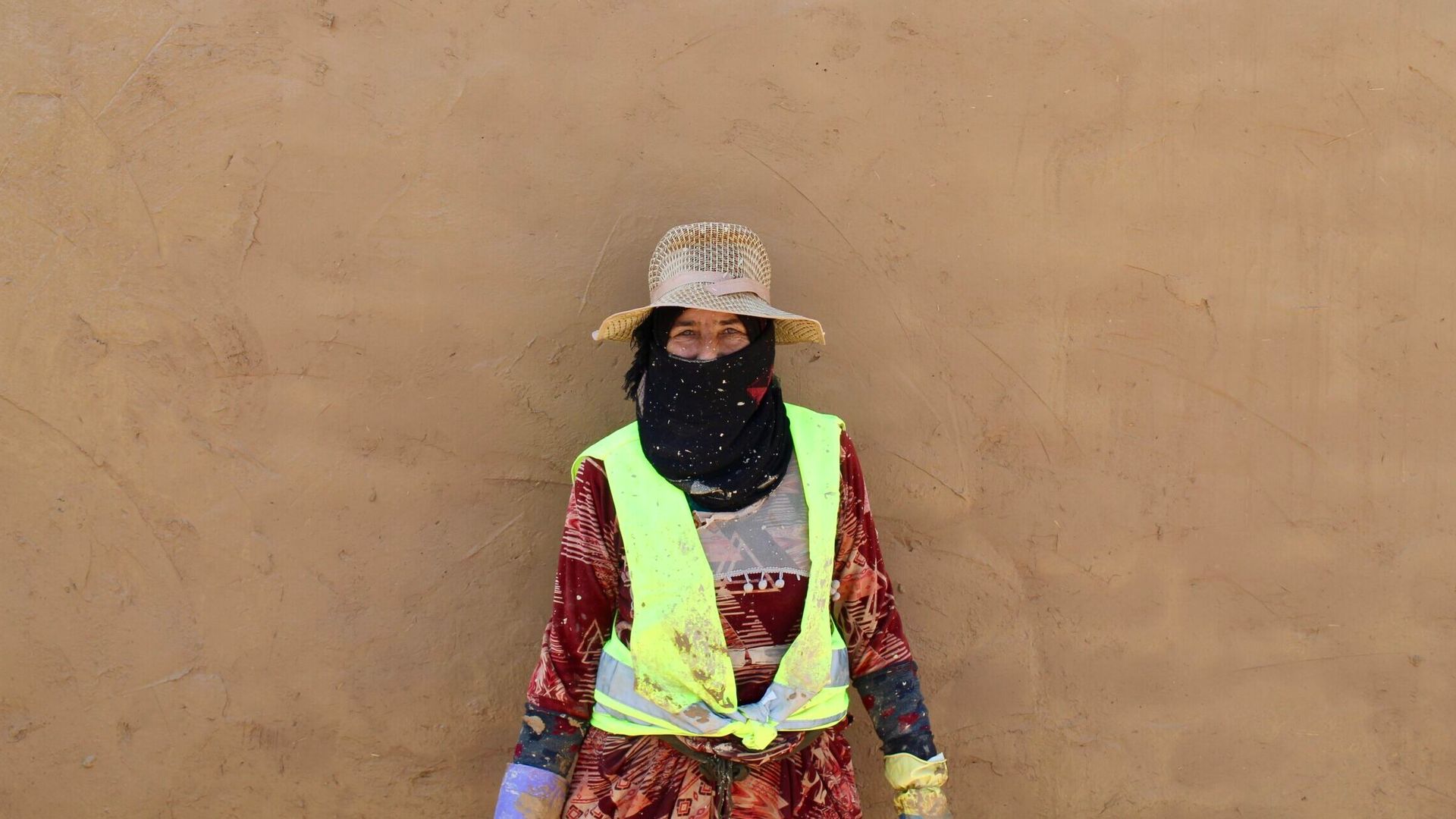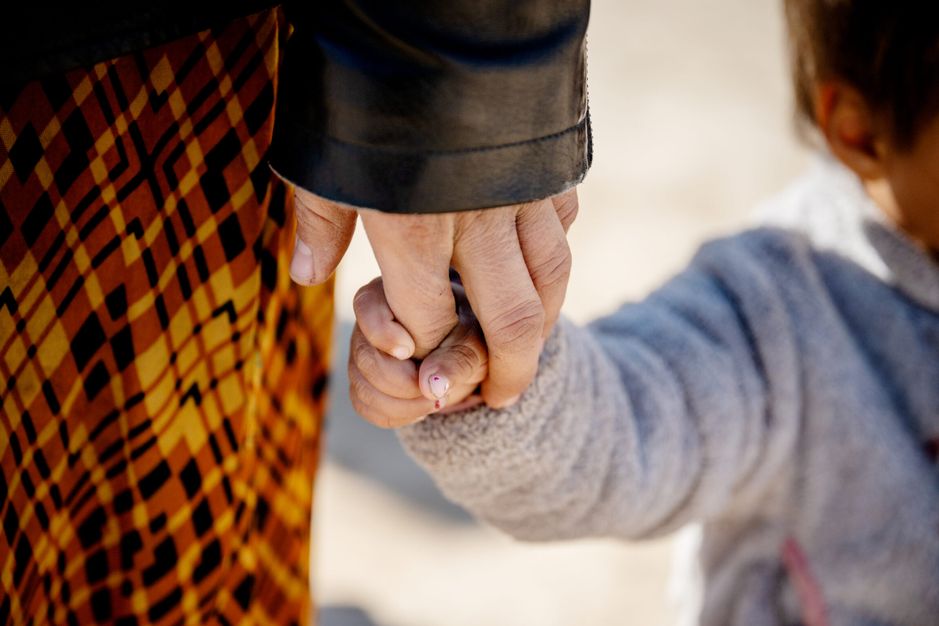Across Syria, the conflict has displaced millions of people, forcing families into informal settlements where access to food, clean water, and basic services is extremely limited. In these challenging conditions, women face a disproportionate burden, as they often have less access to the skills that support their economic independence such as education, ownership of lands and assets compared to men.
In Ar-Raqqa, informal settlements have become the last resort for people who have fled their war-torn hometowns – internally displaced persons. The harsh conditions, both in summer and winter, exacerbate the already dire humanitarian situation.

Al-Dahmoush Informal Settlement
Hajja, a 47-year-old woman originally from Homs, shared her story with DanChurchAid (DCA). After losing her husband and parents, she and her daughter fled their hometown in search of safety, eventually settling in Al-Dahmoush informal settlement in Ar-Raqqa for three years. The transition to Al-Dahmoush was far from easy. Hajja recalls the overwhelming challenges they faced upon arrival:
“The first five months were the hardest. I was sick all the time from the shock of losing everything. We had a farm, a life, and now we are left with nothing.”
Life in the informal settlements is undeniably harsh. In summer, families endure unbearable heat inside tents without electricity. In winter, they struggle to find wood for warmth. These settlements remain largely underserved by humanitarian organisations and local authorities. Most internally displaced persons work as daily labourers, and a day without work means a day without food. Jobs in agriculture are somehow available during summer, but during the winter, employment opportunities diminish, leaving families with very little to survive on.
Female heads of households, like Hajja, are constantly seeking work to provide for their families, but they face significant barriers to sustainable income due to lack of education, vocational skills, and equitable access to market opportunities. This forces many to resort to harmful coping mechanisms, including borrowing money from neighbours, skipping meals, or even marrying off daughters at a young age.
To address these pressing needs, DCA Syria is implementing an integrated project aimed at meeting the urgent needs of people who have been displaced – including shelter and protection – while promoting vocational training (early recovery) and community-based resilience and leadership.
The project includes the building of a community mud-house, which will serve as a hub for the vocational training and activities to take place and then a community centre after the project ends. For this, DCA engaged the community in cash-for-work activities, giving the residents in the informal settlements the chance to lead on the building of the mud-house while also earning a living. Hajja was one of the selected rightsholders for the cash-for-work initiative. Reflecting on her involvement, she said:
“When we heard DCA was starting a project in our settlement, it felt like a lifeline. No one else had helped us in years. This project gave us hope.”
The activity leverages and strengthens the residents’ skills and provides them with livelihoods
opportunities. Hajja, drawing from her experience in building mud-brick houses in her hometown,
where this traditional method is commonly used, joined the team of nine workers tasked with constructing the mud-house.

Hajja during the construction of the mud-house

Hajja during the construction of the mud-house
The impact of this intervention goes beyond the physical structure of the mud house. For women like Hajja, it represents a much-needed opportunity to provide for their families without relying on the loans of their neighbours, who are equally struggling. The payments allowed the participants to purchase essential supplies and prepare for the challenges of the harsh winter. Thus, promoting self-reliance and preparedness. For Hajja:
“With the money I earned, I could finally buy enough food for my daughter and me and pay for doctor appointments. I also saved a little for the winter. It meant I didn’t have to keep asking my neighbours for help, and it was a relief”

Women economic empowerment is essential for sustainable community development. By providing access to vocational training, financial literacy, and resources for small businesses, female heads of households can overcome economic barriers and achieve some degree of independence. The participants in the mud room construction gained technical skills, such as knowing the necessary materials for construction and the mixing ratios.
They also learned how to use the necessary tools for measurement, ensuring the quality of work, and monitoring the progress. Additionally, they learned the appropriate time and requirements for each stage to ensure the completed structure is safe, sustainable, and meets safety standards. This includes building walls that are stable and strong with the foundation and ensuring their vertical alignment, as well as distributing the loads from the roof and connecting it to the walls.
Moreover, they acquired organizational and leadership skills, and the ability to distribute work and tasks efficiently, working as a coordinated group. The skills that Hajja acquired under this activity will create support systems that foster resilience and enable these women to thrive, transforming their lives and communities.
About the project
The project ‘Empowering and strengthening community resilience in NES’ was implemented between July and December 2024 reaching more than 2,200 people.
The main achievements of the project included:
- Improved psychosocial well-being for individuals, with structured support for women and children.
- Women gaining vocational skills and starting income-generating activities.
- Upgraded shelters for individuals in informal settlements ensuring safety and privacy.
- Community-driven protection mechanisms addressing local risks.
Through these interventions, it is expected that families will experience improved mental health, better economic opportunities, and more secure living conditions, paving the way for sustainable recovery.
The project was funded by the Danish Ministry of Foreign Affairs.




